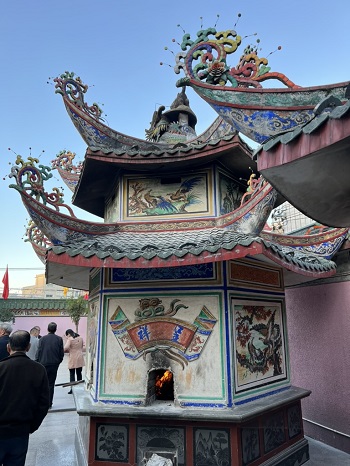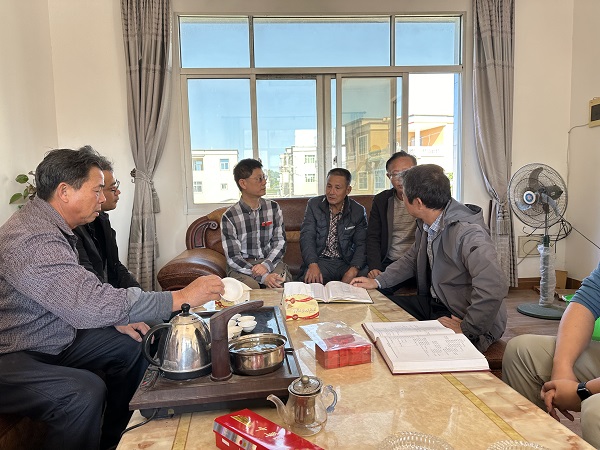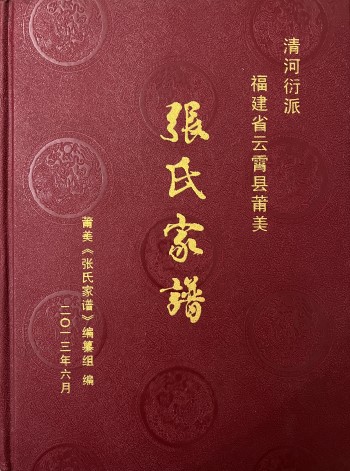During my vacation in China with my wife and son in December 2023, we booked a car for a day trip to Dongshan county (东山县), an island two and a half hours away from the city of Xiamen (厦门), linked to the mainland by bridges. We planned a day of sightseeing and seafood feasts on this vacation island with significant aquaculture.
My grandfather, great-uncle, and great-grandmother left China in the 1930s to escape the chaos. However, my grandfather did not talk much about his life in China and his hometown, so my family had very little information on our ancestral town. My grandfather claimed to be from Zhaoan (诏安) county and carried salt when he was younger. I thus deduced that he must have hailed from Dongshan island as that is where the salt fields are, though the name and location of the exact village remained uncertain. Nevertheless, I am always happy to appreciate the region where my ancestors hail from. I also remarked to my son, who had developed a fascination for linguistics, that my grandfather spoke a little differently from the Hokkien language speakers in Singapore and Xiamen.
Unexpected help from friends
Before the COVID-19 pandemic, Dr He Haidong, a doctor from Shanghai, was attached to my department. While chatting with him, we discussed our ancestral villages, and I remarked that I could only narrow my ancestry to Zhaoan county. He introduced to me another doctor from Zhaoan, Dr Xu Guanghui, and we discussed this matter over WeChat and left it at that.
A few days into my China trip, I mentioned in passing to him that I was going to Dongshan island, and he promptly arranged to have someone meet me at the island to guide us. I was not aware until the day before that his friend, Mr Huang Yanghui, had activated the overseas Chinese liaison associations (侨联) of three counties (Dongshan, Zhaoan, and Yunxiao [云霄])) to help me look for my grandfather's village! I thought I would be chatting with a few local people in a coffee shop. Instead, I was contacted by the chairperson of the Dongshan county's overseas Chinese liaison association, Ms Zhang Ailing, who arranged a meeting.
After arriving at Dongshan island (which used to be part of Zhaoan county but is now its own county), we followed Ms Zhang to Beishan village(北山村). We were met by several elders of the village, including the secretary (or village chief). Ms Zhang explained that there are not many villages in Dongshan with the family name of Teo (which is Hokkien, otherwise known as Zhang [张] in Mandarin), and she reckoned that we were not from her village. However, Beishan village had about 150 households with the name of Teo. The elders proudly showed us the Foshan temple (佛山寺) they had renovated, and we soon settled down to have tea in the senior activity centre.
Before I could drink from my cup, the village chief exclaimed that he had found my grandfather's name in the village's Teo family genealogy book! I verified the names of both my great-uncle (and the fact he left for Singapore) and great-grandfather. One of the elders immediately confirmed that the information was very likely correct. But while we were related, my grandfather was not from Beishan village; instead, he was from Pumei (莆美) town in Yunxiao (云霄) county, about an hour's drive north of Dongshan. Ms Zhang excitedly called the chairman of the overseas Chinese liaison association of Yunxiao county. Our Chinese hosts were overjoyed and celebrated their success by taking us to lunch.
Tracing our lineage
In the afternoon, we travelled to Pumei town. We were met by the members of the Teo family affairs committee (张氏理事会) at a family temple, Yingji Gong (英济宫). I found out later that the temple was dedicated to one of my ancestral aunts who had been deified, which makes for another fascinating story. The family association updated us on the matters of our tribe, which now number 40,000 in the vicinity! Briefly put, like many Han Chinese in Fujian province, we are descendants of the military families sent during the Tang dynasty to pacify the region. One of my ancestors moved from Xilin (西林), Fujian province and founded Pumei around the 1400s. Based on this branch of the family, I am of the 24th generation, although the genealogy book traces the lineage back to Hui, a son of the fifth son (Qing Yangshi) of the mythical Yellow Emperor (黄帝).
As we were constrained by time for this unexpected visit, we were unable to visit the ancestral halls. A copy of the genealogy book was given to me, and we were treated to a reunion dinner. We were invited to visit again with other members of the family in Singapore. After dinner, we made our way back to Xiamen.
My grandfather, like many Chinese Singaporeans, took up the cause of building a new country and did not look back at the country he had left. The tumult of the mid-1950s in China meant that many did not or could not communicate with the relatives they left behind. My father and his brothers were unable to disclose my grandfather's hometown as they were brought up to be Singaporean first. Discovering my ancestral village during this vacation trip was an unexpected adventure, and I hope you will also have an adventure on your next vacation.
If you would like help in finding your ancestral village, you can email SMA News at news@sma.org.sg to get in touch. I bungled my way into finding my own, but I will try to help you as much as I can.

Decorated incense burner in Yingji Temple, Pumei

Reviewing the village genealogy book

Yunxiao Pumei Teo family genealogy book